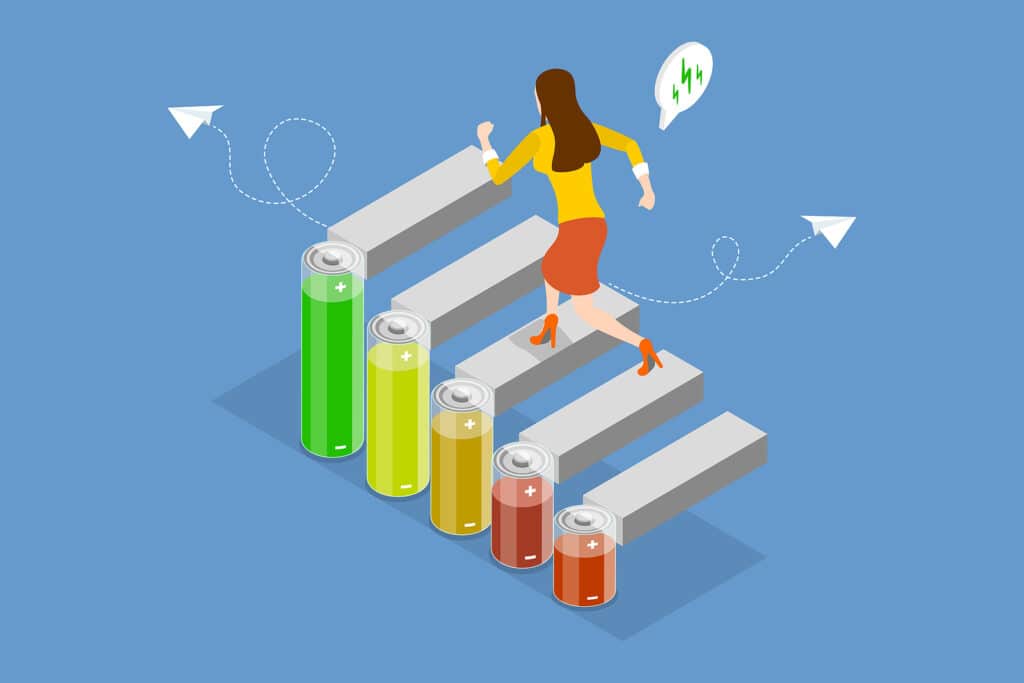Energy Efficiency on Human Health
In today's dynamic world, embracing sustainability isn't just a choice; it's a way of nurturing both our planet and our personal wellness. Within this landscape, the impact of energy efficiency shines particularly bright in our homes. Think about it – by embracing energy-efficient appliances and robust insulation, we're not just trimming utility bills; we're inviting fresher air into our living spaces. The magic happens as we steer clear of conventional heating methods that tend to taint indoor air with pollutants. But there's more to the story: imagine those sweltering summer days.
An energy-efficient haven isn't just about lower temperatures; it's about shielding ourselves from potential heat-related health and safety issues. By maintaining more consistent indoor temperatures, energy-efficient homes offer not only comfort but also a genuine sense of well-being, turning our living spaces into sanctuaries of health. So, as we journey through this guide, get ready to unravel the science behind this intricate relationship, discover the mechanisms that bind energy efficiency and health, and gather practical insights to infuse vitality into our daily lives through sustainable energy choices. Welcome to a world where our homes don't just hold us – they heal us.
The Basics of Energy Efficiency
Energy efficiency is a fundamental principle that revolves around the meticulous and judicious utilization of energy reservoirs to achieve specific objectives, all the while curbing unnecessary energy dissipation. This concept is integral across various domains, encompassing residential, commercial, and industrial landscapes. The underlying philosophy involves the strategic deployment of lesser energy quantum to attain an equivalent level of efficiency and output. This practice, in turn, contributes to the twin objectives of diminishing overall energy consumption, thereby fostering notable advantages for both the ecosystem and human well-being.
The Link Between Energy Efficiency and Human Health
The relationship linking energy efficiency and human health extends far beyond a mere surface connection; it is a complex tapestry of interactions with multifaceted implications. The substantial role that energy consumption plays in driving environmental deterioration underscores the critical nature of embracing energy-efficient methodologies. By doing so, the adverse repercussions of climate change can be alleviated, offering tangible benefits such as enhanced air quality, diminished pollution levels, and an overall improved ecological balance.
Delving deeper, the impact of energy efficiency resonates more intimately within indoor environments. The quality of indoor air, illumination, and thermal comfort, all governed by energy-efficient practices, can exert profound influences on physical well-being, cognitive function, and emotional equilibrium. A judicious approach to energy efficiency has the potential to ameliorate allergen proliferation, mold growth, and the circulation of airborne pathogens, thereby directly contributing to the preservation and enhancement of public health. Furthermore, the psychological effects of well-lit and thermally regulated spaces brought about by energy-efficient designs can substantially elevate occupants' mental wellness and overall quality of life, signifying the far-reaching ramifications of this synergy between energy efficiency and human well-being.

The Mechanisms Behind Energy Efficiency's Impact on Health
Air Quality and Respiratory Health
The underpinnings of energy efficiency harbor a profound potential to orchestrate substantial transformations in the realm of human health. By meticulously curbing the combustion of fossil fuels—reverberating as a formidable source of air pollutants—an intricate web of health-enhancing effects emerges. A transition towards energy-efficient paradigms not only alleviates wastage but also catalyzes a shift towards cleaner energy reservoirs.
This transformative shift reverberates across the atmospheres we breathe, culminating in a tangible enhancement in air quality. The ramifications are significant: a reduction in respiratory ailments like asthma and chronic obstructive pulmonary disease (COPD) becomes palpable, thereby fostering an environment where individuals and communities thrive, fortified by improved respiratory well-being.
Indoor Comfort and Mental Well-being
Delving into the intricacies of energy-efficient methodologies, an awe-inspiring amalgamation of factors intricately woven emerges. From adept insulation strategies to well-orchestrated ventilation mechanics and energy-frugal heating and cooling systems, the tenets of energy efficiency forge environments that transcend mere physical comfort. These nurturing spaces bear testimony to the nuanced intersection between physical and psychological well-being.
The symbiotic interplay is undeniable: spaces suffused with comfort burgeon as sanctuaries of mental equilibrium, catalysts for heightened productivity, and epicenters of holistic happiness. The pivotal role played by proficient HVAC systems reverberates further, adeptly governing humidity levels and in the process, orchestrating a diminution in the specter of mold proliferation and allergic triggers. This intricate amalgamation encapsulates the essence of energy efficiency as an advocate for indoor serenity and mental well-being.
Reduced Noise Pollution for Stress Reduction
Transcending the realm of energy conservation, energy-efficient technologies unfurl as champions of tranquility. In a world reverberating with noise pollution, these technologies don an additional mantle—that of soundproofing and impeccably sealed windows. A dual crusade emerges: energy preservation coalesces with noise attenuation. Chronic exposure to the cacophony that pervades modern existence is a lurking precursor to stress, sleep disturbances, and even cardiovascular perturbations. Embracing the mantle of energy efficiency charts a trajectory towards serenity, cultivating quieter realms that stand as bastions of relaxation and holistic well-being.
Energy Efficiency and Sleep Patterns
Sleep, an intricate thread woven into the fabric of human well-being, finds itself intricately woven into the energy efficiency narrative. As the epoch of energy-efficient lighting unfurls, a symphony with human circadian rhythms resonates. LED bulbs, in synergy with smart lighting systems, mimic the cadence of natural light, orchestrating a dance that traverses the realms of biology and technology. The implications are profound, culminating in an enhancement of sleep quality and overarching health. By harmonizing with the ebb and flow of our sleep-wake cycles, energy-efficient lighting technologies traverse beyond illumination—they become sculptors of robust sleep patterns, nurturing a symbiotic relationship between energy efficiency and human vitality.

Practical Steps to Improve Wellness Through Energy Efficiency
Home Insulation and Sealing
Implementing a comprehensive home insulation strategy goes beyond just conserving energy; it creates a thermal barrier that safeguards your indoor comfort year-round. During colder months, the insulation prevents valuable heat from escaping, ensuring that your living space remains warm and inviting. On the flip side, during warmer months, it acts as a shield against the scorching external temperatures, maintaining a cool oasis indoors. However, the benefits go beyond temperature control. By meticulously sealing gaps and crevices, you're not only preventing uncomfortable drafts but also curbing the infiltration of outdoor pollutants. This meticulous sealing results in improved indoor air quality, creating a healthier environment for you and your loved ones.
Energy-Efficient Appliances and Lighting
Making the transition from conventional appliances and incandescent light bulbs to their energy-efficient counterparts is a tangible step towards lowering your energy consumption. By opting for appliances that boast the ENERGY STAR label, you're embracing a more sustainable approach that has a twofold impact. Firstly, these appliances consume significantly less energy, translating into reduced utility bills and minimized strain on the power grid.
Secondly, they generate less heat during operation, which not only contributes to a safer living environment but also alleviates the burden on your cooling systems, especially in the summer months. In parallel, making the switch to LED bulbs for illumination is a straightforward way to promote energy efficiency. These bulbs not only emit a pleasing and consistent light but also have a longer lifespan, further reducing the need for replacements.
Sustainable Transportation for Personal Health
Taking a holistic approach to wellness extends to your transportation choices. Opting for sustainable modes of transportation—such as biking, walking, carpooling, or utilizing public transit—embodies a conscientious effort to enhance both personal well-being and the environment. By adopting these options, you're actively reducing air pollution, thereby minimizing your exposure to harmful emissions. This not only leads to cleaner air for everyone but also directly benefits your respiratory health. Additionally, these alternatives alleviate the stress associated with traffic congestion, promoting a more serene and mentally balanced commuting experience.
Moreover, integrating physical activity into your daily routine through modes like biking or walking adds an extra layer of wellness, contributing to improved cardiovascular health and overall vitality. In embracing these transportation choices, you're harmonizing the well-being of both yourself and the planet.
Features of Energy Efficiency on Human Health
Energy efficiency has a significant impact on human health by reducing environmental pollution, enhancing indoor air quality, and promoting overall well-being. Here are some key features of how energy efficiency positively affects human health:
Air Quality Improvement
Energy-efficient technologies and practices often result in lower emissions of pollutants from energy sources such as power plants and vehicles. This leads to improved outdoor air quality, which directly benefits respiratory health. Reduced emissions of harmful pollutants like sulfur dioxide, nitrogen oxides, and particulate matter contribute to lower rates of respiratory diseases such as asthma, bronchitis, and lung infections.
Indoor Air Quality
Energy-efficient buildings are designed with better ventilation systems and materials that minimize the accumulation of indoor air pollutants like volatile organic compounds (VOCs) and mold. Improved indoor air quality helps prevent allergic reactions, respiratory issues, and other health problems caused by poor ventilation and exposure to pollutants indoors.
Thermal Comfort
Energy-efficient buildings are well-insulated and equipped with efficient heating, cooling, and ventilation systems. This leads to consistent indoor temperatures and humidity levels, promoting thermal comfort. Maintaining optimal thermal conditions is essential for avoiding heat-related illnesses, such as heat exhaustion and heatstroke, as well as cold-related ailments.
Reduced Noise Pollution
Energy-efficient buildings often include better insulation, sealed windows, and soundproofing materials. These features help decrease exposure to external noise sources, leading to reduced stress levels and better sleep quality. Chronic exposure to high noise levels is linked to various health issues, including cardiovascular problems and sleep disturbances.
Lower Greenhouse Gas Emissions
Energy efficiency measures reduce the consumption of fossil fuels, which are major contributors to greenhouse gas emissions and climate change. By decreasing emissions, energy efficiency indirectly mitigates the health risks associated with climate change, such as increased heat-related illnesses, vector-borne diseases, and respiratory issues from worsened air quality.
Energy Conservation and Physical Health
Promoting energy efficiency often involves encouraging physical activity, such as walking or cycling instead of using motor vehicles for short trips. Increased physical activity reduces the risk of obesity, cardiovascular diseases, and related health problems.
Economic Benefits
Energy-efficient homes and appliances tend to have lower operating costs, leading to financial savings for individuals and families. These savings can be redirected towards healthcare, education, and other health-improving investments.
Community Health
Widespread adoption of energy efficiency practices can lead to reduced demand for energy production, which in turn lowers the need for new power plants and associated environmental impacts. This can prevent the displacement of communities due to pollution and reduce the negative health effects experienced by marginalized populations living near industrial areas.
Where to Find Resources and Further Information
Reputable Websites and Organizations
- U.S. Department of Energy (energy.gov): The official website of the U.S. Department of Energy provides comprehensive information on energy efficiency initiatives, research, and resources. It offers insights into the connection between energy conservation and its positive impact on health, both at individual and community levels.
- Environmental Protection Agency (epa.gov): The EPA's website offers valuable information on how energy efficiency contributes to better air quality, reduced emissions, and overall environmental health. It outlines the co-benefits of energy efficiency programs on public health and showcases case studies supporting these claims.
- International Energy Agency (iea.org): The IEA offers global insights into energy efficiency practices and policies. Their reports highlight the connection between energy efficiency measures, reduced greenhouse gas emissions, and the resulting improvements in human health and well-being.
- American Council for an Energy-Efficient Economy (aceee.org): ACEEE provides in-depth research on the health co-benefits of energy efficiency programs. Their reports and briefings delve into the specific ways in which energy-efficient practices positively influence respiratory health, thermal comfort, and overall quality of life.
Books and Research Papers
- “Drawdown: The Most Comprehensive Plan Ever Proposed to Reverse Global Warming” by Paul Hawken: This book offers a comprehensive look at various strategies to combat climate change, including energy efficiency. It explores how reducing energy consumption can lead to significant improvements in human health by mitigating environmental impacts.
- “Energy Efficiency: Principles and Practices” by Edward L. Saxon and Lisa M. Daniels: This book provides an in-depth exploration of the principles and practices of energy efficiency. It offers detailed insights into how energy-efficient technologies and strategies can directly influence human health and well-being.
- “Health Co-Benefits of Energy Efficiency Programs: A Briefing from the American Council for an Energy-Efficient Economy” (aceee.org): This briefing paper from ACEEE dives deep into the nuanced health benefits of energy efficiency. It presents evidence-based research on reduced air pollutants, improved indoor air quality, and the subsequent positive impact on respiratory health.
Online Courses and Workshops
- Coursera (coursera.org): Coursera offers a range of courses focused on sustainability, energy efficiency, and environmental health. These courses provide comprehensive insights into the various dimensions of energy efficiency and its wide-ranging effects on human health and the environment.
- edX (edx.org): edX features a diverse selection of courses related to energy efficiency and its impact on human health. These courses, often developed in collaboration with prestigious universities, delve into the intricate relationship between energy conservation, pollution reduction, and overall well-being.
Conclusion
As I reflect on this journey through the intricate dance of energy efficiency and its profound effects on human well-being, I'm struck by the intimate ways in which our choices can shape our lives. Beyond the surface, energy efficiency isn't just about saving resources or lowering costs—it's a catalyst for a richer, healthier existence. From the serene haven of our homes to the bustling world outside, the embrace of energy-efficient practices paints a portrait of comfort, cleaner air, and a quieter, more restful environment.
It's like discovering a hidden treasure where every step towards sustainability becomes a step towards nurturing a life intertwined with both personal vitality and the health of our planet. This realization empowers me to embrace energy efficiency not just as a practical choice, but as a meaningful commitment to crafting a future where my well-being and the well-being of our world are beautifully entwined.
Sources
- https://www.iea.org/reports/multiple-benefits-of-energy-efficiency/health-and-wellbeing
- https://www.mwalliance.org/sites/default/files/meea-research/health-fact-sheet-final.pdf
- https://www.aceee.org/sites/default/files/ee-health-1008.pdf
- https://www.energy.gov/eere/health-and-safety-benefits-clean-energy
- https://www.ncbi.nlm.nih.gov/pmc/articles/PMC3869478/
- https://www.nrdc.org/stories/energy-efficiency-clean-facts
- https://www.ncbi.nlm.nih.gov/pmc/articles/PMC9223700/

